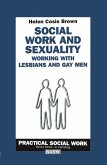Feminist theories of social work have been criticised in recent years for treating women as a uniform category and displaying insufficient sensitivity to the complex ways in which other social divisions (those of race, age, disability, etc.) impact on gender relations. This major text by a leading writer in the field seeks to develop a new framework for feminist social work that takes on board postmodernist arguments to do with difference and power yet retains a commitment to collective solidarity and social change. As such, it will be essential reading for students, educators and practitioners alike in social work.
Bitte wählen Sie Ihr Anliegen aus.
Rechnungen
Retourenschein anfordern
Bestellstatus
Storno









